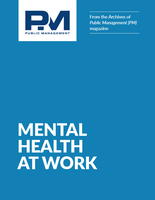
As employers plan to reopen their workplaces, they’ll need to make decisions on how to redesign their offices to prioritize worker health and safety. It’s equally important that leaders incorporate into those plans how to support the emotional and mental well-being of employees, who likely face new concerns, stressors and demands brought on by a return to office life.
Employees who suddenly moved to remote work as COVID-19 spread experienced a loss of control over many aspects of daily life. They coped with high levels of uncertainty about their personal, professional, and financial future. Phasing workers back into the office may create new uncertainties about personal safety and how to adapt to new routines.
For some employees returning to the office may be a welcome opportunity. They may have worked in a makeshift office with uncomfortable furniture and poor technology or felt isolated from colleagues. For others, such as those who are caregivers or concerned about their health, leaving home to return to the office can increase stress and worry.
Organizational leaders can look to psychology for strategies that help employees feel less apprehensive about returning and more optimistic about the office environment. Psychologists recommend that employers ease uncertainty by giving each employee control and decision-making power over where, how, and when they work.
Prepare for the return by supporting employees now.
Recognize that every employee had a different experience and reaction to the pandemic and remote work, each facing unique stressors. Employers and leaders can set a tone that emphasizes concern for employee well-being by offering compassion, honesty, and openness. Check in with employees and actively listen, so they feel heard. Communicate consistently to reduce employees’ uncertainty and build emotional support.
Take an individualized approach.
Now is the time to think beyond one-size-fits-all approaches to how employees work. Managers and employees will lead the most effective strategies for returning to the office and adapting to changes. Provide autonomy to managers and direct supervisors to help employees develop individualized plans. Employees returning to the workplace may need new approaches to routines that they have lost; supervisors play a role in helping staff structure their day.
Managers also play a key role in supporting mental health and well-being and are the front-line of recognizing employee mental health struggles. Provide managers with the training and resources that they can use to help their staff. For example, improve mental health literacy with psychological first aid or training in how to talk about mental health. Let them know how to work with the employee assistance program as a tool for connecting employees for services.
Empower employees with work flexibility.
Employers can create a favorable environment by encouraging employee control over decisions about where and when they work. Consider if the employee can continue to work remotely or set own working hours. Employers can also consider providing a dedicated flex hour, beyond lunch, that is devoted to outdoor activities, recreation, or exercise. This extra time can serve as a coping strategy to help people recharge and transition from remote work to office work.
Involve employees in discussions about their workspace.
Talk with them about what might change and what they need. Employees who are informed and participate in decisions about their own space have greater psychological comfort in the workspace. This engagement helps them adapt to changes that employees can’t control, such as requirements to promote physical distancing. Employers can solicit input regarding individual workspace needs, such as task lighting, sound-masking devices, and flexibility to rearrange furniture.
Leaders are role models and help set examples.
Employees look to leaders during a crisis. Acknowledge that returning to the office isn’t a return to the way people previously worked. Organizational-wide policies and practices may need to adapt and change with the uncertainty of the pandemic’s effects. Prepare to be flexible, consistent in communications, and a role model for showing support and encouraging individual control and decision-making.
Reprinted with permission from the American Psychological Association.

May is Mental Health Awareness Month, an important topic for our readers after a challenging year in local government. ICMA members can read more in PM’s special supplement, Mental Health at Work. Nonmembers can purchase the supplement here.
New, Reduced Membership Dues
A new, reduced dues rate is available for CAOs/ACAOs, along with additional discounts for those in smaller communities, has been implemented. Learn more and be sure to join or renew today!
